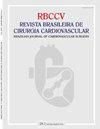Surviving the Struggle of COVID-19: Practical Recommendations for Pediatric/Adult Cardiology and Cardiac Surgical Programs in Resource-Limited Settings: a Review
IF 1.1
4区 医学
Q4 CARDIAC & CARDIOVASCULAR SYSTEMS
Revista Brasileira De Cirurgia Cardiovascular
Pub Date : 2022-03-10
DOI:10.21470/1678-9741-2021-0477
引用次数: 0
Abstract
Introduction The primary aim of this systematic review is to provide perioperative strategies to help restore or preserve cardiovascular services under threat from financial and personnel constraints imposed by the coronavirus disease 2019 (COVID-19) pandemic. Methods The Medical Literature Analysis and Retrieval System Online, Excerpta Medica dataBASE, Cochrane Central Register of Controlled Trials/CCTR, and Google Scholar were systematically searched using the search terms “(cardiac OR cardiology OR cardiothoracic OR surgery) AND (COVID-19 or coronavirus OR SARS-CoV-2 OR 2019-nCoV OR 2019 novel coronavirus OR pandemic)”. Additionally, the webpages of relevant medical societies, including the World Federation Society of Anesthesiologists, the Cardiothoracic Surgery Network, and the Society of Thoracic Surgeons, were screened for relevant information. Results Whereas cardiac surgery and cardiology practices were reduced by 50-75% during the pandemic, mortality of patients with COVID-19 increased significantly. Healthcare workers are among those at high risk of infection with COVID-19. Conclusion Hospitals must provide maximum protective equipment and training on how to use it to healthcare workers for their mutual protection. Triage management of patients — which accounts for patient’s clinical status and risk-factor profile relatable to which services are available during the COVID-19 pandemic — is recommended. A strict reorganization of the hospital resources including preoperative, intraoperative, and postoperative detailed protective measures is necessary to reduce probability of vector contamination, to protect patients and the cardiovascular teams, and to permit safe resumption of cardiological and cardiac surgical activity.在新冠肺炎的斗争中幸存:在资源有限的环境中对儿科/成人心脏病学和心脏外科项目的实用建议:综述
引言本系统综述的主要目的是提供围手术期策略,以帮助在2019冠状病毒病(新冠肺炎)大流行造成的财务和人员限制的威胁下恢复或保存心血管服务。方法利用检索词“(心脏或心脏病学或心胸外科)与(新冠肺炎或冠状病毒或SARS-CoV-2或2019-nCoV或2019新型冠状病毒或大流行)”,系统检索医学文献分析与检索系统在线、医学数据库摘录、Cochrane对照试验中央注册中心/CTR和Google学者。此外,还对包括世界麻醉师联合会、心胸外科网络和胸外科医生学会在内的相关医学会的网页进行了相关信息筛选。结果尽管在大流行期间心脏手术和心脏病实践减少了50-75%,但新冠肺炎患者的死亡率显著上升。医护人员是感染新冠肺炎的高危人群之一。结论医院必须为医护人员提供最大限度的防护设备,并对其进行使用培训,以实现他们的相互保护。建议对患者进行分类管理,考虑患者的临床状况和与新冠肺炎大流行期间提供的服务相关的风险因素概况。有必要严格重组医院资源,包括术前、术中和术后详细的保护措施,以降低病媒污染的可能性,保护患者和心血管团队,并允许安全地恢复心脏病和心脏外科活动。
本文章由计算机程序翻译,如有差异,请以英文原文为准。
求助全文
约1分钟内获得全文
求助全文
来源期刊

Revista Brasileira De Cirurgia Cardiovascular
CARDIAC & CARDIOVASCULAR SYSTEMS-SURGERY
CiteScore
2.10
自引率
0.00%
发文量
176
审稿时长
20 weeks
期刊介绍:
Brazilian Journal of Cardiovascular Surgery (BJCVS) is the official journal of the Brazilian Society of Cardiovascular Surgery (SBCCV). BJCVS is a bimonthly, peer-reviewed scientific journal, with regular circulation since 1986.
BJCVS aims to record the scientific and innovation production in cardiovascular surgery and promote study, improvement and professional updating in the specialty. It has significant impact on cardiovascular surgery practice and related areas.
 求助内容:
求助内容: 应助结果提醒方式:
应助结果提醒方式:


